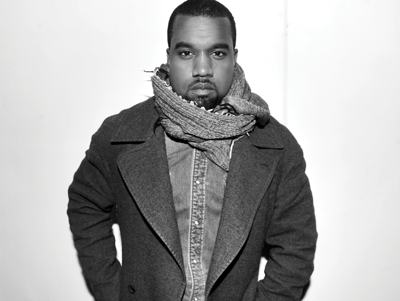Kanye West has been giving a lot of interviews lately. The historically media-reclusive artist has taken a different approach in 2013 when it comes to speaking to the press. In June, Kanye gave two rare print interviews — one to The New York Times, the other to W Magazine — to promote the impending release of his sixth studio album, Yeezus. But those are the only interviews he's given to print publications this year. The interviews he's been giving in support of his current Yeezus Tour are a bit different.
West has been on a radio and television frenzy lately, starting with the epic BBC Radio 1 interview conducted by Zane Lowe in late September. Since then, the rapper's been dropping in at various local radio stations along the tour, even making a late-night TV appearance. This is all unorthodox for Mr. West, but then again, nothing about Yeezus — from the promotion to the merchandise to the album itself — has been remotely orthodox. Why, though, the recent change of heart from him in regard to the media?
It's important to note that the interviews West has done in the past few months have been for radio or television — opportunities for the notoriously forthcoming rapper to broadcast his thoughts unfiltered, without the threat of publications spinning it out of context. In the past, West has been wary of the press and what he interprets as attempts to misconstrue or adulterate his words. But right now, he feels compelled to speak, and to do so via transparent media.
The recent change comes at a transitional point in West's life. He's newly engaged and has a baby daughter, and he's also reached a tipping point in his career. If 2010's My Beautiful Dark Twisted Fantasy was the zenith of Kanye West's musical progression, Yeezus is his declaration that he no longer has any artistic obligations to fulfill. His recent media appearances have featured the same recurring themes and talking points, and it all makes for a (relatively) coherent picture of West's current mental state.
Kanye is on a mission. Aside from the details he's been giving on his family life, the only things he's discussed lately are his non-musical creative ambitions. Anyone who remembers his epic Twitter rant in January 2012 that served as the public introduction for his creative company, DONDA, knows generally where West's head has been since Dark Twisted Fantasy. He essentially sees himself as a public servant — a purveyor of "awesomeness," as he might put it. He has ideas and wants to change the world through design. He told San Francisco's 99.7 KMVQ-FM that the world can be saved through design, because design is about "form, function, solutions and problem-solving. Not politics." He stated in numerous interviews that he's interested in tackling a variety of things: film, fashion, even city planning and educational curriculum. But he's frustrated, because he feels he can't win any backing from the gatekeepers whose access he requires to fully pursue any of his long-term goals.
On one hand, the sheer scale of West's ambition makes it difficult to take him very seriously. Kanye is already perhaps the most polarizing figure in popular culture, stirring arguments even among his supporters. It's easy to dismiss a lot of what he says as just Kanye being Kanye — sounding off because he can. But those who don't learn from history are doomed to repeat it. Those who underestimate Kanye are doomed to be proven wrong.
Yeezy was in a similar place roughly 10 years ago. He was the premier producer for the premier hip-hop crew at the time, Roc-A-Fella Records. But he was unfulfilled. In his heart, he'd always been a rapper. Those were his long-term goals, and gatekeepers and popular convention were holding him back.
West is attempting to break the traditional artist career trajectory. He's mastered music and now wants to move on to the next phase of his career. He told Los Angeles' 97.1 KAMP-FM that music is no longer his main focus, though he doesn't plan on quitting rap for good, just like he never stopped producing. Kanye's current dilemma raises a lot of important questions that are not often addressed. What exactly is the role of the "revered" artist in society? Once someone has become a "master" in a given field, what right does he or she have to attempt something else? In 2002 — after he was turned down by record company after record company — many of the claims Kanye West made about his upcoming rap career sounded absurd but in retrospect were downright prophetic. Much as he is doing now (with gatekeepers and with the public), he essentially pleaded to be let into the rap game. He told the world he had something to share — something he felt everyone needed.
West recently reminded interviewers at L.A.'s 106 KPWR-FM that he's always been the same person. It's not until you get older and show a certain affinity for a skill set that people put you in a box, he said. It's true. Kanye went to art school. He's always shown an eye for fashion, and design at large. There was a point when conventional wisdom would have said that Kanye's legacy would end at "legendary producer."
What was that quote about history again?
Email Music@nashvillescene.com.





